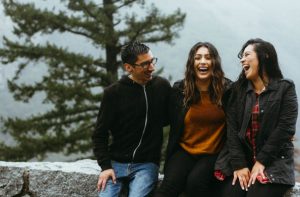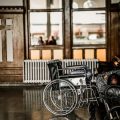This is the last in Ashley’s eight-part series about her health journey. To read the rest, click here.
After a year of intense experiences, the truth is that I am still striving to find the lighthouse every day. Some days my view is clear and focused, and other days I have to look long and hard through the clouds to see even a glimpse of the light. L. Todd Budge said it best: “Trusting in the Lord includes trusting in His timing and requires patience and endurance that outlast the storms of life.” This endurance to outlast the storms of life describes my life well. As far as a diagnosis, the only possible definition I have been given is conversion disorder. In my opinion, this is fibromyalgia of the brain—or, in other words, “Something is happening to you, but we don’t have a solid reason as to why.” Even more confusing, the psychiatrists and neurologists keep sending me back and forth to each other. So even if I do have the disorder, there is no agreed treatment plan.
 The lack of solid answers has been frustrating, but it has also led to a beautiful dependence on a loving God. It feels like I am a toddler again learning how to walk, but this time I get to learn with God. The poet Rumi stated:
The lack of solid answers has been frustrating, but it has also led to a beautiful dependence on a loving God. It feels like I am a toddler again learning how to walk, but this time I get to learn with God. The poet Rumi stated:
“Sorrow prepares you for joy. It violently sweeps everything out of your house, so that new joy can find space to enter. It shakes the yellow leaves from the bough of your heart, so that fresh, green leaves can grow in their place. It pulls up the rotten roots, so that new roots hidden beneath have room to grow. Whatever sorrow shakes from your heart, far better things will take their place.”
That is how it feels. I’m slowly getting rid of preconceived notions of what my life should look like and how I should feel. Instead, I am choosing to accept that I don’t know all of the answers, that I can’t fix everything by myself, and that there is so much more to a person than any illness or other obstacle they face in life.
It’s hard to say which came first, the depression or the doctors, but the reality is that I struggle with mental illness. I’ve been told by people I dated in the past that those with such problems would be hard to love. Family members and friends have pointed out the stigma, but most importantly, I have been hiding from myself in shame and embarrassment. The truth I’m discovering is that my illness doesn’t make me less or more than anyone else. It simply is my trial and obstacle at this time in my life. (We all get different versions of that.) I believe in some weird way, God is using this experience for my good.
There are many things that I can’t control as I push my way forward through life, but I’m learning to be intentional about the things that I can. Some daily practices have become essential. Getting enough sleep, staying hydrated, surrounding myself with good music and spiritual things, spending time in the sun, being with people, and, most of all, service are what get me through. If I am intentional about those things, the Lord makes up for the rest. Even still, I faint sometimes—and while I despise it, if I intentionally choose to let it go, then I can usually get right back to my life in a matter of a minute or so.
One day maybe this whole thing will go away or maybe there will be a treatment. But if not, I am working to find meaning and purpose in my everyday life. I gave up a while ago on doing anything grand or amazing and instead find hope in the small acts of goodness that I can provide. I can pray. I can write a note. I can send a text. I can do a little here or there.
 Currently, I’m doing pretty well with keeping the dark suicidal thoughts aside. I can’t guarantee I’ll never have them again. Sickness and weird episodes of varying degrees that are unexplained are tiring. The darkness comes in waves and not always when I would expect it. However, a friend really helped me put it in a perspective that has been working to keep me grounded. She explained that while suicide feels like you are only hurting yourself, the act actually acts more like a suicide bomb, spewing your pain and sadness onto all of those around you. I don’t always feel the purpose in my life, but I do value the happiness of others, so this has been extremely helpful for me.
Currently, I’m doing pretty well with keeping the dark suicidal thoughts aside. I can’t guarantee I’ll never have them again. Sickness and weird episodes of varying degrees that are unexplained are tiring. The darkness comes in waves and not always when I would expect it. However, a friend really helped me put it in a perspective that has been working to keep me grounded. She explained that while suicide feels like you are only hurting yourself, the act actually acts more like a suicide bomb, spewing your pain and sadness onto all of those around you. I don’t always feel the purpose in my life, but I do value the happiness of others, so this has been extremely helpful for me.
Every day I get to pick up a few more of the broken pieces of my life and slowly put them back together again. This comes in small steps like going to the gym four times a week with my brother and sister-in-law. It comes in spending 15 minutes a day trying to clean my room. It comes in answering people honestly about how I’m doing. It comes from chatting with my roommate rather than hiding in my room. It isn’t huge chunks of the puzzle at a time, but slowly every piece is starting to come together again, and I can see that there is more than just a pile of pieces: there is a picture and a plan for my life.
Instead of an ending, maybe the conclusion of my story is simply just a beginning. The conclusion is a new start to the next chapters of my life. Even though I don’t have all of the answers, I know enough to keep pushing forward. I know that through it all, I will have the love of my Savior by my side. I know that my weaknesses, sins, and overall shortcomings won’t prevent me from that love. That love, I believe, is what will heal my body and my soul.
About Ashley Dewey
Ashley Dewey is extremely talented at being single. Hobbies include awkward conversations with members of the opposite sex, repelling third dates, talking to boys about their girl problems and to girls about their boy problems. In her spare time she also has a very fulfilling school life, work life, and social life.
Besides being a professional single, Ashley is also a BYU graduate with a degree in linguistics (Aka word nerd). She enjoys studying other languages, particularly American Sign Language, and finds most all of them fascinating. She is currently pursuing a masters degree in Teaching English as a Second Language.
Ashley works most of the time and has often been accused of being a workaholic. Currently she works full time as a merchandiser and supervisor in a retail store, and part time doing social media work. On her day off she works (really it doesn't feel like work) in the Provo LDS temple. The only kind of work she finds difficulty focusing on is house work.
Her favorite activities in her free time are reading, writing, creating social experiments, and spending time with great friends and family. Specific activities with those family and friends include: going to concerts, plays, dance recitals, BYU basketball and football games, and watching sports on television.
Twitter •






